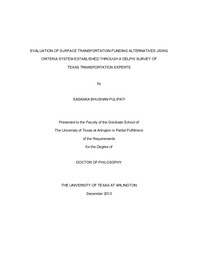
ATTENTION: The works hosted here are being migrated to a new repository that will consolidate resources, improve discoverability, and better show UTA's research impact on the global community. We will update authors as the migration progresses. Please see MavMatrix for more information.
Show simple item record
| dc.contributor.author | Pulipati, Sasanka Bhushan | en_US |
| dc.date.accessioned | 2014-03-12T23:51:49Z | |
| dc.date.available | 2014-03-12T23:51:49Z | |
| dc.date.issued | 2014-03-12 | |
| dc.date.submitted | January 2013 | en_US |
| dc.identifier.other | DISS-12375 | en_US |
| dc.identifier.uri | http://hdl.handle.net/10106/24140 | |
| dc.description.abstract | For more than a decade, transportation officials have been concerned that, at current levels, the fuel tax, the primary funding source of surface transportation in the United States, would not provide enough revenue to satisfy the ever rising transportation needs. Recent studies have evaluated alternative funding strategies at the national and state levels. In this dissertation, the author improves this evaluation procedure by developing a multi-criteria evaluation of different funding options for implementation in Texas using a technique called PROMETHEE. This evaluation uses a new criteria system established through his Delphi survey of Texas-based experts who are experienced in transportation financing and/or participate in transportation funding policy decisions. With a well-organized survey process, the author tries to develop a consensus among the officials from metropolitan planning organizations in Texas, various districts of the Texas Department of Transportation and the staff of the Texas Legislative Transportation Committee members regarding the criteria and their weights. The resultant criteria weights seem to indicate that the expert panel members recognize the importance of public opinion and its impact on reaching a legislative solution. They appear to be less concerned about criteria that may be addressed through research and modifications to the funding alternatives. This research shows that the funding policy is not seen as a tool for improving user efficiency; this result differs from the common view in the literature that encourages the fuel tax's replacement with VMT charges, which have high implementation and operating costs. Since the criteria system is based on a Texas based panel opinion, it likely strengthens the credibility of the resultant recommendations among the public. Based on his evaluation, the author recommends increasing the fuel tax and tolling all new freeway capacity, while gradually moving towards congestion based tolls on all toll roads as the set of future funding options. Through a scenario analysis, he shows that his recommendations are not affected by the differences in opinion regarding the criteria weights or any uncertainties in the scoring. Complex, high-cost methods that require advanced technology such as VMT charges and tolling of all existing urban highways are not preferred.Previous researchers' attempts to identify new alternatives have mainly concentrated on improving the revenue sustainability and promoting efficient travel behavior. With this research, the author tries to bring back the focus to public acceptance and any factors that influence it. Effort to improve the public awareness of transportation funding needs and to improve the public acceptance of increasing the fuel tax and other user charges appear critical for future success.The author also analyzes the choice of implementing local funding solutions in place of statewide funding solutions. In the expert survey, the panel members suggest a balance between the two types of funding while the statewide funding should remain primary. Based on the literature review and Delphi survey responses, the author proposes the integration of both methods such that statewide funding remains primary, local funding is coordinated by regional planning and the user-pay principle continues to govern transportation funding. | en_US |
| dc.description.sponsorship | Mattingly, Stephen P. | en_US |
| dc.language.iso | en | en_US |
| dc.publisher | Civil & Environmental Engineering | en_US |
| dc.title | Evaluation Of Surface Transportation Funding Alternatives Using Criteria System Established Through A Delphi Survey Of Texas Transportation Experts | en_US |
| dc.type | Ph.D. | en_US |
| dc.contributor.committeeChair | Mattingly, Stephen P. | en_US |
| dc.degree.department | Civil & Environmental Engineering | en_US |
| dc.degree.discipline | Civil & Environmental Engineering | en_US |
| dc.degree.grantor | University of Texas at Arlington | en_US |
| dc.degree.level | doctoral | en_US |
| dc.degree.name | Ph.D. | en_US |
Files in this item
- Name:
- Pulipati_uta_2502D_12375.pdf
- Size:
- 6.803Mb
- Format:
- PDF
This item appears in the following Collection(s)
Show simple item record


